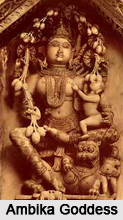 Ambika Goddess is a Jain goddess who holds great importance. She is a Jain Yakshi that is a dedicated attendant of Lord Neminath, the 22nd Tirthankara. She is also known as "Sasana Devi", the "protector" goddess. Ambika Devi is called by other names like "Ambai", "Amba" and "Amra Kushmandini".
Ambika Goddess is a Jain goddess who holds great importance. She is a Jain Yakshi that is a dedicated attendant of Lord Neminath, the 22nd Tirthankara. She is also known as "Sasana Devi", the "protector" goddess. Ambika Devi is called by other names like "Ambai", "Amba" and "Amra Kushmandini".
The Jains worshipped Ambika Goddess as the Mother Goddess of Jainism. She is regarded as the patron deity of material prosperity, childbirth and protection of women. She is said to represent fertility and also as a source of protection against the evil forces of nature. The Jains had adopted her for in the form of an early Yakshi, "Bahuputrika" meaning one who has many children. However, she began to be referred as "Ambika" towards the end of 6th century CE.
Iconography of Ambika Devi
The idol of Ambika Devi is represented in golden colour. Her vehicle is a Lion. She has 4 arms. She is seen holding a mango and a branch of a mango tree in 2 of her right hands. In her left hands she is seen carrying a rein and 2 of her sons, "Priyankara" and "Shubhankara".
Temples of Ambika Devi
There are several dedicated to Ambika Devi. Among them the major 3 temples dedicated to her are:
•Shri Neminath Adhisthayaka Nagotra Solanki Gotria Kuladevi Shri Ambikadevi Jinalaya in Santhu near Bagra. It is located in Jalore district in the Rajasthan state.
•Shri Kuladevi Ambikadevi Jain Temple located at Takhatgarh in Pali district of Rajasthan.
•Shri Kuladevi Ambikadevi Jain Temple situated in Padarli in Rajasthan state.
This article is a stub. You can enrich by adding more information to it. Send your Write Up to content@indianetzone.com









